
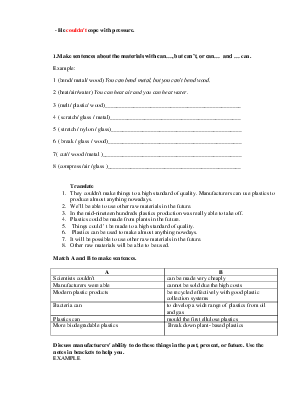
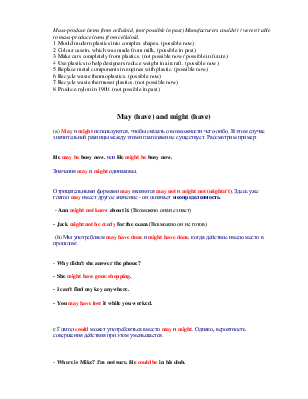
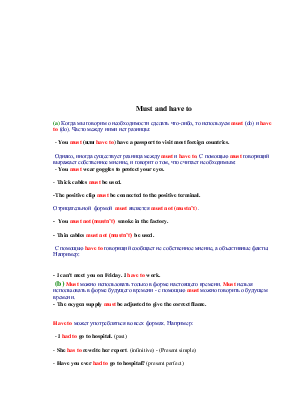
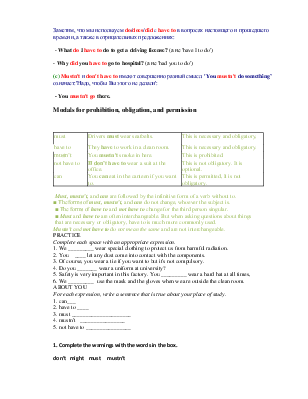
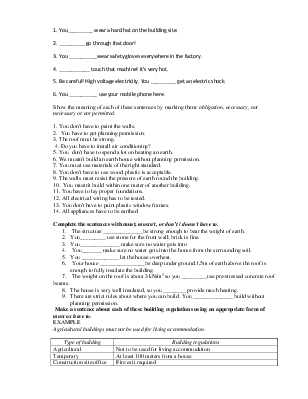
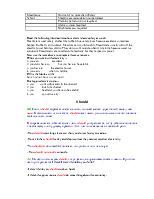
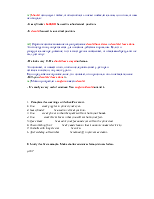
Modals
Can, could and be able to
(a) Глагол сan употребляется, чтобы сказать, что нечто может произойти, или некто способен сделать нечто. Отрицательная форма - can't или cannot.
Oxygen can be stored at very high pressure (120 atmospheres).
This gas cannot escape easily from the battery if the filter plugs are not removed.
Be able to является возможной заменой can, когда идет речь о физической возможности:
- A train is able to climb a rising gradient more easily if this rising gradient follows a falling gradient.
- I'm not able to work under pressure every day.
Так как can имеет только две формы: can (настоящее время - present) и could (прошедшее время - past), то для других времен необходимо употребление be able to.
- He hasn't been able to work recently. (can has no Present Perfect)
- She might not be able to fly to London. (can has no infinitive)
(b) Could и was able to:
Иногда could употребляется как прошедшее время от can.
Old bricks could be used instead of sand.
Panels couldn’t be made of glass.
Преимущественно сould используется со следующими глаголами:see, hear, smell, taste, feel, understand, remember:
- He spoke so quickly that I couldn't understand him at all.
- Though I was sitting in the last row, I could see the film well.
Could используется также, чтобы отметить несомненную возможность кого-либо сделать что-либо:
- My teacher could speak five languages.
Но если мы имеем в виду, что некто справляется с чем-либо при определенных условиях, надо употреблять was/were able to (не could):
- They were able to complete the construction in time.
- She wasn't able to pass the exam.
Отрицательная форма couldn't допустима во всех случаях.
- He couldn't cope with pressure.
1.Make sentences about the materials with can…, but can’t, or can… and … can.
Example:
1 (bend/ metal/ wood) You can bend metal, but you can’t bend wood.
2 (heat/air/water) You can heat air and you can heat water.
3 (melt/ plastic/ wood)________________________________________________
4 ( scratch/ glass / metal)______________________________________________
5 ( stretch / nylon / glass)______________________________________________
6 ( break / glass / wood)_______________________________________________
7( cut// wood /metal )_________________________________________________
8 (compress /air /glass )_______________________________________________
Translate
1. They couldn't make things to a high standard of quality. Manufacturers can use plastics to produce almost anything nowadays.
2. We’ll be able to use other raw materials in the future.
3. In the mid-nineteen hundreds plastics production was really able to take off.
4. Plastics could be made from plants in the future.
5. Things could ' t be made to a high standard of quality.
6. Plastics can be used to make almost anything nowdays.
7. It will be possible to use other raw materials in the future.
8. Other raw materials will be able to be used.
Match A and B to make sentences.
|
A |
B |
|
Scientists couldn't |
can be made very cheaply |
|
Manufacturers were able |
cannot be sold due the high costs |
|
Modern plastic products |
be recycled effectively with good plastic collection systems |
|
Bacteria can |
to develop a wide range of plastics from oil and gas |
|
Plastics can |
mould the first ellulose plastics |
|
More biodegradable plastics |
Break down plant- based plastics |
Discuss manufacturers' ability to do these things in the past, present, or future. Use the notes in brackets to help you.
EXAMPLE
Mass-produce items from celluloid, (not possible in past) Manufacturers couldn't / weren't able to mass-produce items from celluloid.
1 Mould modern plastics into complex shapes. (possible now)
2 Colour casein, which was made from milk, (possible in past)
3 Make cars completely from plastics. (not possible now / possible in future)
4 Use plastics to help designers reduce weight in aircraft. (possible now)
5 Replace metal components in engines with plastic. (possible now)
6 Recycle waste thermoplastics. (possible now)
7 Recycle waste thermoset plastics. (not possible now)
8 Produce nylon in 1900. (not possible in past)
May (have) and might (have)
(a) May и might используются, чтобы сказать о возможности чего-либо. В этом случае значительной разницы между этими глаголами не существует. Рассмотрим пример:
|
He may be busy now. или He might be busy now. Значения may и might одинаковы. |
Отрицательными формами may являются may not и might not (mightn't). Здесь уже глагол may имеет другое значение - он означает неопределенность:
- Ann might not know about it. (Возможно она не знает)
- Jack might not be ready for the exam.(Возможно он не готов)
(b) Мы употребляем mayhavedone и mighthavedone, когда действие имело место в прошлом:
- Why didn't she answer the phone?
- She might have gone shopping.
- I can't find my key anywhere.
- You may have lost it while you worked.
сГлагол could может употребляться вместо may и might. Однако, вероятность совершения действия при этом уменьшается.
- Where is Mike? I'm not sure. He could be in his club.
Must and have to
(a) Когда мы говорим о необходимости сделать что-либо, то используем must (do) и have to (do). Часто между ними нет разницы:
- You must (или have to) have a passport to visit most foreign countries.
Однако, иногда существует разница между must и have to. С помощью must говорящий выражает собственное мнение, и говорит о том, что считает необходимым:
- You must wear goggles to protect your eyes.
- Thick cables must be used.
-The positive clip must be connected to the positive terminal.
Отрицательной формой mustявляется mustnot (mustn’t) .
- You mustnot (mustn’t) smoke in the factory.
- Thin cables must not (mustn’t) be used.
С помощью have to говорящий сообщает не собственное мнение
Уважаемый посетитель!
Чтобы распечатать файл, скачайте его (в формате Word).
Ссылка на скачивание - внизу страницы.